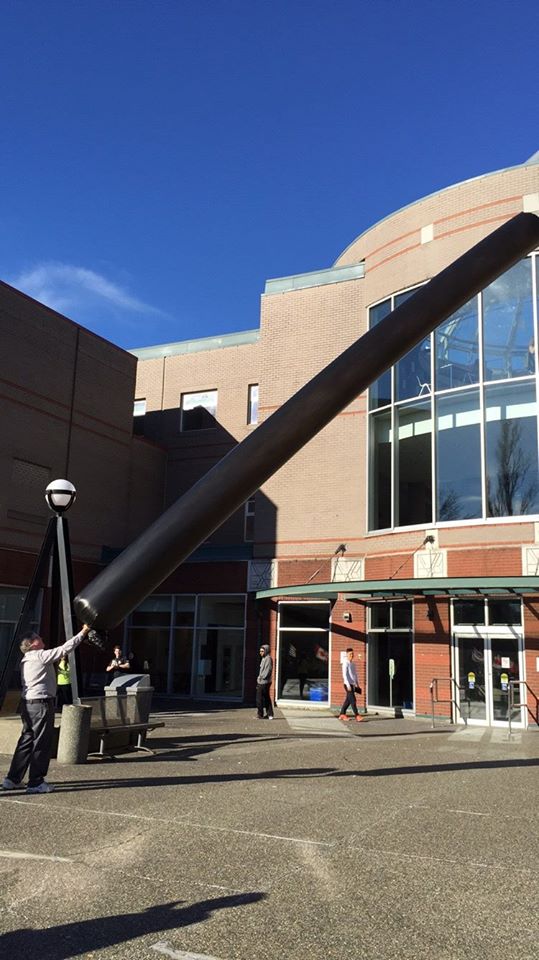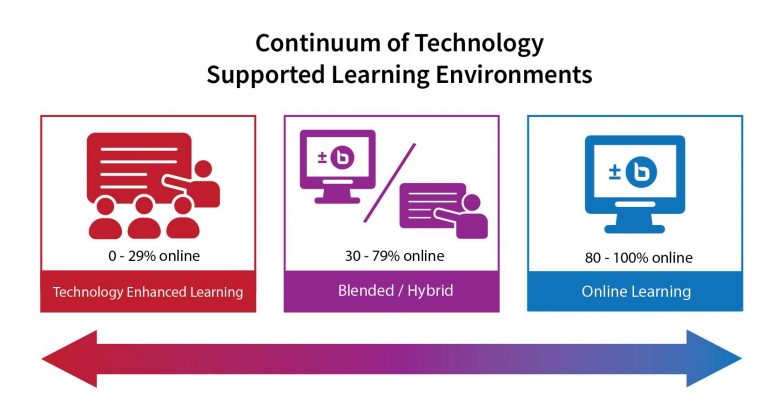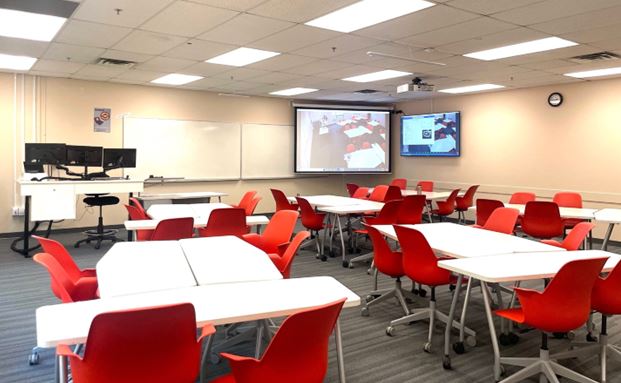Faculty Spotlight: Don Mathewson
Written by: Lisa Gedak
Don Mathewson values family. This fact is evident when you look at the smiling pictures adorning the walls of his Richmond campus office, and when he speaks about those closest to him. This deep-rooted appreciation for familial values permeates into his practice at KPU where he teaches physics, “I love being a parent, I think largely I view my students as somebody else’s children, even when they’re here, and they’re older, they are still somebody else’s children; so, I take care of them like I would like somebody to take of my children.” This declaration for the care of his students is only one of the reasons Don is deserved to be recognized for teaching excellence.
When I arrived at Don’s office door for this interview, he was in the process of folding boxes upon boxes of T-shirts for the Kwantlen Science Challenge, of which he is the founder. The Kwantlen Science Challenge is a day-long event for teams of students from grades eight to twelve, and consists of practical laboratory challenges, and activities that are designed to be educational and entertaining. This multi-school event allows for high school students to explore KPU’s programs and facilities. Don founded the event in order to “promote science and experimental science, and attract high school students to KPU programs” For him, this is cyclic as the road leading to his own physics career began in high school “I studied physics in high school, and when it came time to go to university it just seemed like the hardest thing, so I thought I would do that”. Clearly, Don was up for the challenge, and, as his first ten years of teaching was within the high school context, organizing an event of this nature came honestly. He notes that his current post-secondary learners and the high school students he taught in those first years of his career are not so different “by and large, I don’t have a significantly different approach, you know, I am a physics teacher; I teach physics to everybody”, and if organizing one large multi-school event each year wasn’t enough, Don took over the Junior Physics and Engineering competition about seven years ago, where junior science students in the lower mainland from various schools in grades eight to ten; learn about physics, build stuff, and have some fun. It is another chance for Don to introduce high school students to the world of physics and what KPU programming has to offer.

Once new students arrive on his door, he has some interesting lessons to offer. One of the more visually dynamic experiments he has done of late is demonstrating thermal expansion and buoyancy for his thermal physics students at KPU Richmond campus in an open outdoor space. “basically, it’s a really big garbage bag, you get the students to run around and fill it with air. They fill it up in the shade and get it, so it is fairly tight and then bring it out into the sun. As it warms up, it expands and becomes less dense, and it floats” physics offers many opportunities for experimentation and active experiences, and the learning is scaffolded from the first year to the second “in first year, they are maybe not yet so proficient with their hands, so it is much more about interactive demonstrations. Some students might participate in the demonstration physically, but they all participate in it intellectually. You will elicit predictions, then have them discuss the predictions, and then do a final reveal, and then discuss what that shows you; that’s a technique called interactive lecture demonstrations, which is something that I use a lot in that class” and Don has many of these interactive lecture demonstrations, with no particular favourite, “anything that has an unexpected result really creates teachable moments, you get their attention when something happens, they didn’t expect. One easy one is that I take a margarine lid, cut it in half and project it for the class to see, and I push a golf ball, and it rides against the rim of the lid. The question to the class is which path does it follow when it leaves the margarine lid? There are three choices, one, because of circular momentum it keeps going, two, because there is no more force on it goes in a straight line, three, because when something pulling in a circle is going outwards, the golf ball tends to fly outwards” Obviously having no background in physics, I really didn’t know what the answer could be, nevertheless, I couldn’t help but contribute a guess as his enthusiasm was palpable. It would stay circular, right Don? “that is Aristotelian thinking, Aristotle circular motion, the motion of the planets moving around the sun was natural, that’s the way things move; for him, the hard thing was to explain things going in a straight line. But of course, Newton, said that if there is no force, objects will go in a straight line; that is the law of inertia; and that the reason things move in a circle is that there is a force acting on them. So, all those answers are very well prescribed, but then you do the demonstration to see who’s right?” So, who is right? Well, it turns out Newtonian thinking is correct “when the rim is no longer pushing on it, it goes in a straight line” He notes that by using physics assessment tests around the world, researchers have found that most students tend to be natural Aristotelian thinkers rather than Newtonian thinkers.
By the time those first-year students end up in second year, they are ready to participate in their own experiments “In my second-year courses, the experiments are actually built into the class, they actually do seatwork experiments, and when you are teaching thermal dynamics there are a lot of neat little experiments you can do to reinforce their learning” Clearly, whether first year, or second; his students are benefitting from more than just passively listening to lectures. And it is not only KPU students and lower mainland high schoolers who are benefiting from Don’s wisdom, enthusiasm, and kindness.

Aside from teaching, Don was heavily involved for six years in the Richmond minor jets hockey association as Referee in Chief. This involved a lot of communication and education of the young referees, the parents, the players, and the executive. Don loved this role and the community involvement that went with it. In fact, his dedication to his hockey family, and the love for his community, led him to go under the clippers on behalf of the minor hockey association for BC Children’s hospital and to shave off his hair and beard “I’d always said that one day I would grow a big bushy beard and then I would take it off and just be done with it, and so the catalyst was this hair shaving fundraiser came up, and I thought here’s a good opportunity, it was just that extra push I needed.” Not everyone was sad to see it go, “It was time to lose the hair. Everybody hated it, my kids hated it, my wife hated it, my parents hated it, my sisters hated it; so eventually it just became time” but, did the beard reach the level of bushiness he was hoping for? “No, I wanted a Gandalf beard,” so, is there a Gandalf beard in Don’s future? “No, it’s been done. I enjoyed it, but as I said everybody else that mattered hated it” that may be true, but members of the Richmond scout troop where Don is the current treasurer had no complaints.

“I was Santa for the party, I had both the beard and the girth; and I had the merry laugh” Don was a scout as a kid in Montreal, and once his kids were both in scouts, becoming involved was natural “When my kids get involved in things, I pitch in and help out” physics also had a part to play in his scout role “There are programs at the weekly meetings, and some of them are STEM programs, and in the past, I have brought in science demonstrations to show the troop” It seems Don’s love for family and teaching are never far apart. But Don is not always the teacher; there have been many lessons he has learned from scouts and hockey that he pulls into his teaching practice “with sports, you learn about how to handle stressful situations, right? and difficult people, so, maintaining your cool as the only adult in the room is important as both a referee and in the classroom. Also, scouting is largely about character, so as an instructor I try to maintain high standards of personal conduct, I don’t use profanity, I try to frame things in positive ways, those attitudes are important.”
Those valuable lessons and the desire to foster collaborative learning experiences for his students, also contribute to Don’s teaching excellence “the students spend the large part of class working in groups on whiteboards in what I call studio mode” These collaborative opportunities spark deeper thinking and help students make essential connections “when I hear them say something insightful, or talk back and forth and come up with a solution I find inspiring, it infuses me with positive energy” I can’t help but wonder if there is any further room for positive energy in this man. Still, before I can ponder this, his eyes dart back to the pictures of his family on that office wall “They are what really infuses me with positive energy” he says, and again reiterates that all of his students are “somebody else’s children” and that this frames his teaching. Thank you for being a part of the KPU family Don, and for treating the students that grace your classroom as a part of yours



